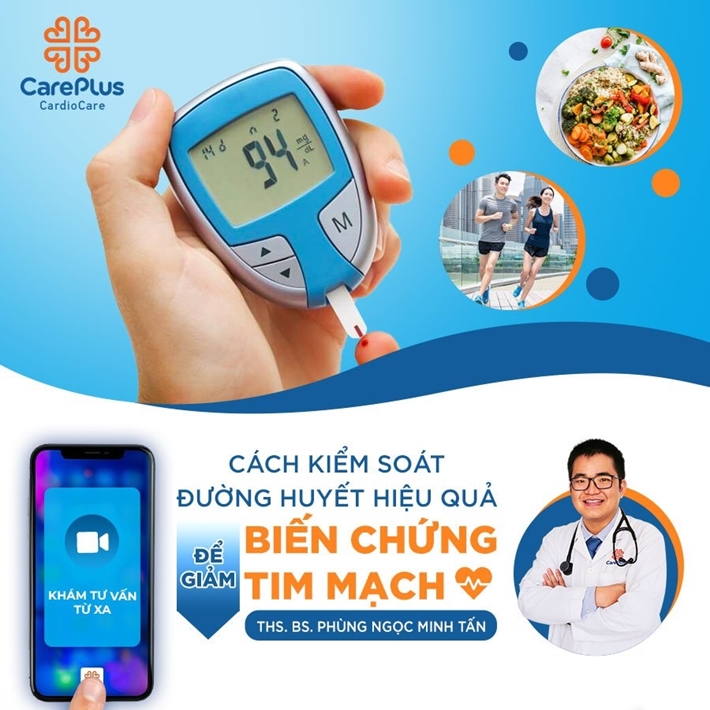Tips for controlling blood sugar to reduce heart disease risk
Keeping your blood sugar within the range recommended by your doctor can be a challenge. That's because many things cause your blood sugar to change, sometimes unexpectedly.

8/30/2021 12:19:01 PM
Factors that can affect blood sugar:
- Diet
- Exercise regime
- How to use the drug?
- How to deal with illness
- Alcoholic drink
- Menstruation and menopause
- Mental stress
With the proper dietary and lifestyle adjustments, maintaining healthy blood sugar levels is easier than you think. Here are some suggestions to help you maintain a healthy blood sugar level and keep it in balance:
11 HEALTHY WAYS TO HELP EFFECTIVE BLOOD SUGAR
1. Minimize processed foods
The first step to achieving balanced blood glucose levels: eliminate (most) packaged foods and focus on high-quality whole foods like vegetables, fruits, whole grains, beans, nuts, seeds, Quality meat, and fish. Many processed foods are high in sugar, refined grains and starches, and artificial ingredients and flavorings but low in fiber and glycemic-stabilizing protein.
2. Eat a lot of fiber
Eat a variety of non-starchy, high-fiber vegetables, fiber-rich fruits, and whole grains. That's because fiber slows carbohydrate digestion and sugar absorption, reducing blood sugar spikes after meals.
Good sources of fiber include leafy greens, Brussels sprouts, broccoli, artichokes, raspberries, peas, beans, lentils, peas, avocados, pumpkin seeds, and oatmeal.
3. Eat lots of high-quality protein
Like fiber, protein regulates the hormone insulin secretion, leading to a gradual rise in blood sugar after a meal. It also makes you feel fuller more than any other nutrient. Eating a protein-rich breakfast is especially important as it helps set the tone for the rest of the day.
Eat wild-caught fish, grass-fed beef, pasture-raised chicken and eggs, or plant-based protein sources.
4. Consume Healthy Fats
Avoid refined fats, including trans fats and processed vegetable oils, such as corn, soy, and safflower oils, increasing inflammation. Quality fat sources include nuts, olive oil, buttermilk, coconut oil, avocados, and fatty fish like salmon.
5. Increase the number of beneficial carbohydrates
There is no need to cut out carbohydrates completely (they are still an essential source of fuel for the body). Just swap out refined carbohydrates like bread, pasta, and candy for fiber-rich food sources like whole grains, sweet potatoes, and fruit, which contain some of the vitamins, minerals, and antioxidants you need for your health.
6. Balance meals
Eating some protein, fiber, and healthy fats with each meal can help stabilize blood sugar and control appetite. Each of these nutrients on its own helps balance blood sugar levels, which is even better when combined.
7. Light dinner
A late, hearty dinner can be the cause of poor blood sugar control. That's because, in the evening, the body is less responsive to insulin - so spread causes blood sugar spikes more than the meal you eat in the morning.
8. Sleep more, stress less
Both insomnia and stress can increase levels of the stress hormone cortisol, which raises blood sugar. Try to get 7 to 9 hours of sleep each night and adopt stress-reducing habits like exercise, meditation, or yoga.
9. Drink lots of water
Drinking water helps the kidneys get rid of excess sugar in the blood through urine. One study found that people who drank more water had a lower risk of developing high blood sugar.
10. Exercise regularly
Your muscles need blood glucose for fuel, which means that when you do that strength training routine, you're helping to move blood sugar from your bloodstream into your muscles to be then burned by your forces.
Intense exercise can temporarily raise blood sugar, so starting moderately, like walking, jogging, or yoga, is a good idea.
11. Eat magnesium-rich foods
Magnesium plays a vital role in maintaining healthy blood sugar levels and improving sensitivity to the hormone insulin. Beans, dark chocolate, and butter are intelligent choices.
Certain chromium-rich foods such as broccoli, barley, and oats have also been shown to help when combined with magnesium-rich foods.